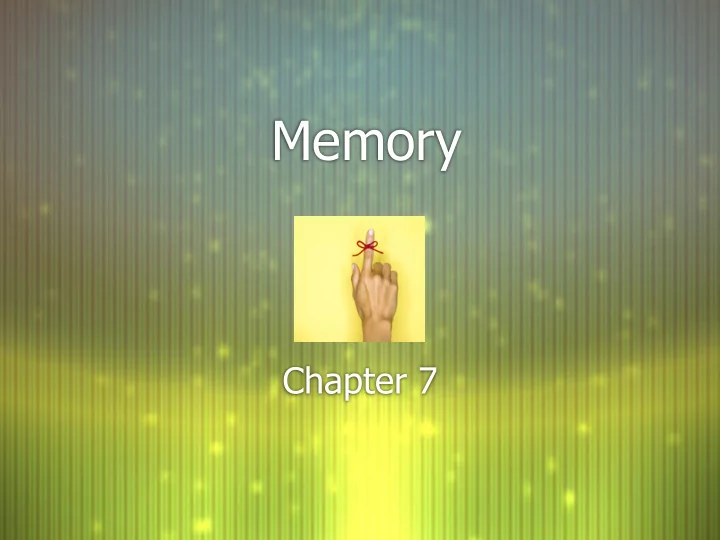

Memory Chapter 7
Encoding, Storage and Retrieval of Memor y Encoding Storage Retrieval Forgetting
Three Systems of Memory Sensory memory Iconic memory Echoic memory Working/ short-term memory - storage process starts here - Chunk Rehearsal Mnemonics Working memory
Three Systems of Memory Long-term memory: storage – two track memory Declarative memory - facts Semantic memory - general info Episodic memory - autonoetic consciousness Procedural memory – skills –implicit memory
Biological Bases of Memory Biochemical changes at specific synapses produced by memory – result of learning Long-term potentiation – neural basis for learning and memory – increases in excitability of neurons Explicit memory – conscious - role of hippocampus Implicit memory – retaining learned skills without conscious awareness of this learning Consolidation - REM sleep Flashbulb memories Distribution of memory Orbitofrontal cortex connection
Retrieval of Long-term Memories Retrieval - Recognition Recall Relearning Retrieval cues Priming
Emotion, Remembering and Forgetting Siegel material – Memory trace – enduring physical changes in brain as memory forms Not all experiences affect mind equally Brain appraises events as meaningful If amygdala activated = “ value-laden ” memory – preverbal role in childhood Selective inhibitions of mind Self-regulation is related to modulation of emotion Forgetting -essential aspect of explicit memory
Emotion, Remembering and Forgetting Proactive Interference – information learned earlier interferes with recall of new material Reactive Interference – difficulty recalling information because of later exposure to different material
Constructive Processes Serial reproduction – “ telephone ” inaccurate Memory in courtroom - poor recall Repressed memories controver sy - Researchers Therapists Legal issues
Film - False Memories
Memory Dysfunctions - Amnesia Amnesia- Retrograde amnesia = memory lost for occurrences prior to event Anterograde amnesia = memory lost for events following trauma Childhood amnesia – memory starts around 3-4 years of age Aging
Memory Dysfunctions - Alzheimer ’ s Alzheimer ’ s – loss of short-term memory, explicit/ declarative memory - risk factors: age, genes, head injury Progressive and fatal disease Most common form of dementia No current cure Loss of plasticity/ learning Personality changes Spread of distorted protein “ tau ”
Memory Dysfunctions - Alzheimer ’ s Diagnosis – Neuropsychological exam Lab blood tests Mental status testing Brain imaging – CT, MRI, PET Amyloid plaque buildup Risk factors - age; genetic; head trauma (TBI) Rate of progression varies
Film - Alzheimer’s
Memory Dysfunctions - Alzheimer ’ s Preventative steps - Drugs Control blood pressure Exercise Eat right Maintain friendships Stimulate mind Estrogen / anti-inflammatory drugs
Memory Dysfunctions – False Alzheimer ’ s Diagnosis Meds that Mimic A. Conditions Which Mimic A . Antihistamines Normal pressure Sleeping pills hydrocephalus Painkillers Anti-anxiety drugs Vitamin / hormone Cholesterol drugs deficiencies Older antidepressants Heavy alcohol consumption Incontinence drugs Urinary tract infection Acid-reflux drugs Herpes simplex virus type 1 Blood pressure drugs “ Silent emboli ” = blockage in Tranquilizers tiny blood vessels Heart drugs Stomach drugs Parkinson ’ s drugs
Improving Your Memory Visual imagery Association with bizarre Decide what you need to remember Pay attention - focus - repeat Use mnemonics aids : lists, cards Be consistent Keep mind active and busy Pace yourself Memory wonder drug - sugar (glucose)
Memory Test Rest Snore Bed Sound Night Eat Wake Tired Slumber Awake Dream Comfort
Recommend
More recommend